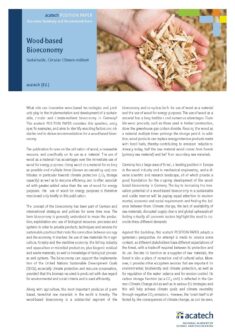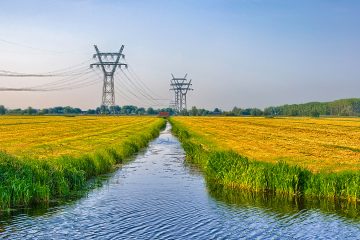Wood-based bioeconomy – a driver of innovative technologies?
![acatech President Jan Wörner, Daniela Thrän (Helmholtz Centre for Environmental Research), André Wagenführ (TU Dresden), Anemon Strohmeyer (Verband der Deutschen Holzwerkstoffindustrie e.V.) and emcee Martin Bimmer (acatech) [from left to right].](https://en.acatech.de/wp-content/uploads/sites/6/2023/03/Foto-News-aaD-Holz-1.jpg)
Munich, 17 February 2023
For millennia, wood has been an important and versatile building and construction material, and it is also used to generate energy. Innovative technologies, products and services based on wood can make an important contribution to sustainable economic activity, especially today. This was the message of the experts at “acatech am Dienstag” on 14 February, which dealt with the wood-based bioeconomy.
After acatech President Jan Wörner welcomed the more than 40 guests, acatech member André Wagenführ from the Chair of Wood and Fibre Material Technology of TU Dresden presented the results of the acatech project “Holzbasierte Bioökonomie – Treiber innovativer Technologien” (“Wood-based bioeconomy – a driver of innovative technologies”). The Position Paper published on this focuses on the use of wood as a material. Giving innovative examples from different sectors of industry, the position paper identifies enabling factors and barriers, and makes recommendations for action for politics, science, industry and society. In his talk, André Wagenführ underscored the impact of using wood, a renewable resource, as a material. He said that such use has crucial advantages over the direct use of wood as a source of energy. Using wood as a material for as long as possible and maximising reuse (cascading use) contributes, in particular, to climate protection (it acts as a carbon sink) as well as to resource efficiency and it is often associated with greater added value. He gave the example of the paper industry with its high recycling rate of 76 per cent as well as innovations in the area of self-shaping wood furniture and sustainable packaging. Germany has a large area of forested land, it holds a leading position in Europe in the timber industry and in mechanical and plant engineering and it also has a diverse scientific and research landscape. These, combined with a systematic approach that considers the limited availability of raw materials and the various demands on the forest as an ecosystem, create good conditions to further develop the wood-based bioeconomy.
Daniela Thrän, Chairperson of the federal government’s Bioeconomy Council and professor at the Helmholtz Centre for Environmental Research (UFZ) went into the use of wood for energy. She said that wood is currently used equally as a material and for energy, at 50 per cent each. Private households account for the majority of energy usage, at approximately 22 per cent, whereas large combustion plants account for around 18 per cent of the wood used for heat provision. While mainly material flows stemming from the cascade are used for the latter – above all scrap wood – in most cases firewood, which often comes from privately owned woods, provides heat in private homes. Increasingly, briquettes and pellets are also burned. The percentage of wood used for energy has remained almost constant in recent years. However, the fact that energy prices are high at present due to ongoing crises is likely to have an impact on the use of wood for energy, said Daniela Thrän. The maximum reuse of wood as a material should at any rate take precedence over the direct use of wood for energy. For that reason, grants for using wood for energy should be phased out and, ideally, such use restricted to waste material and definitely combined with the use of heat pumps or solar panels.
Anemon Strohmeyer, Managing Director of the German Wood-Based Panel Association (VHI), described how versatile wood is as a material. It is vital to use the resource that is wood, i.e. both the primary and secondary raw material, as efficiently as possible: not only the entire tree but also the thinnings as well as wood stemming from agricultural production and landscape maintenance should be utilised and the parts used as a material for as long as possible, she said. In addition, the quantitative and qualitative availability of secondary raw materials, such as scrap wood, should be increased by means of recycling and cascading use – also to contribute to climate protection by prolonging the storage of carbon in products. Policymakers, industry and consumers each have a role to play: when drafting provisions, it is vital to ensure consistency and to strike a balance between use and protection. Industry has to adapt to using other kinds of wood grown in more climate-resilient forests. Consumers could contribute to climate protection by purchasing more sustainable, longer-life and recycled wood products.
In conclusion, the experts stated that an ambition for the future would be for wood-based secondary raw materials to play a greater role in the circular economy coupled with the minimal use of resources. The life of wood must be extended and the loops closed, they said. The throw-away society has to be motivated to change its attitude and be more conscious in its use of resources and products. To achieve this, it is necessary to be mindful of recyclability when designing a product.
“acatech am Dienstag” took place on Valentine’s Day as part of the “Flower Power Festival München“. During the festival, which runs until 7 October 2023, further events will be held over the coming months with themes such as plant health, artificial photosynthesis and nitrogen use.






